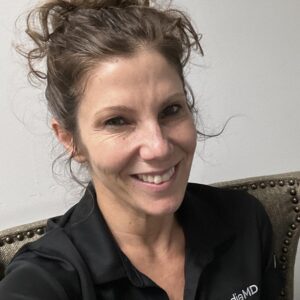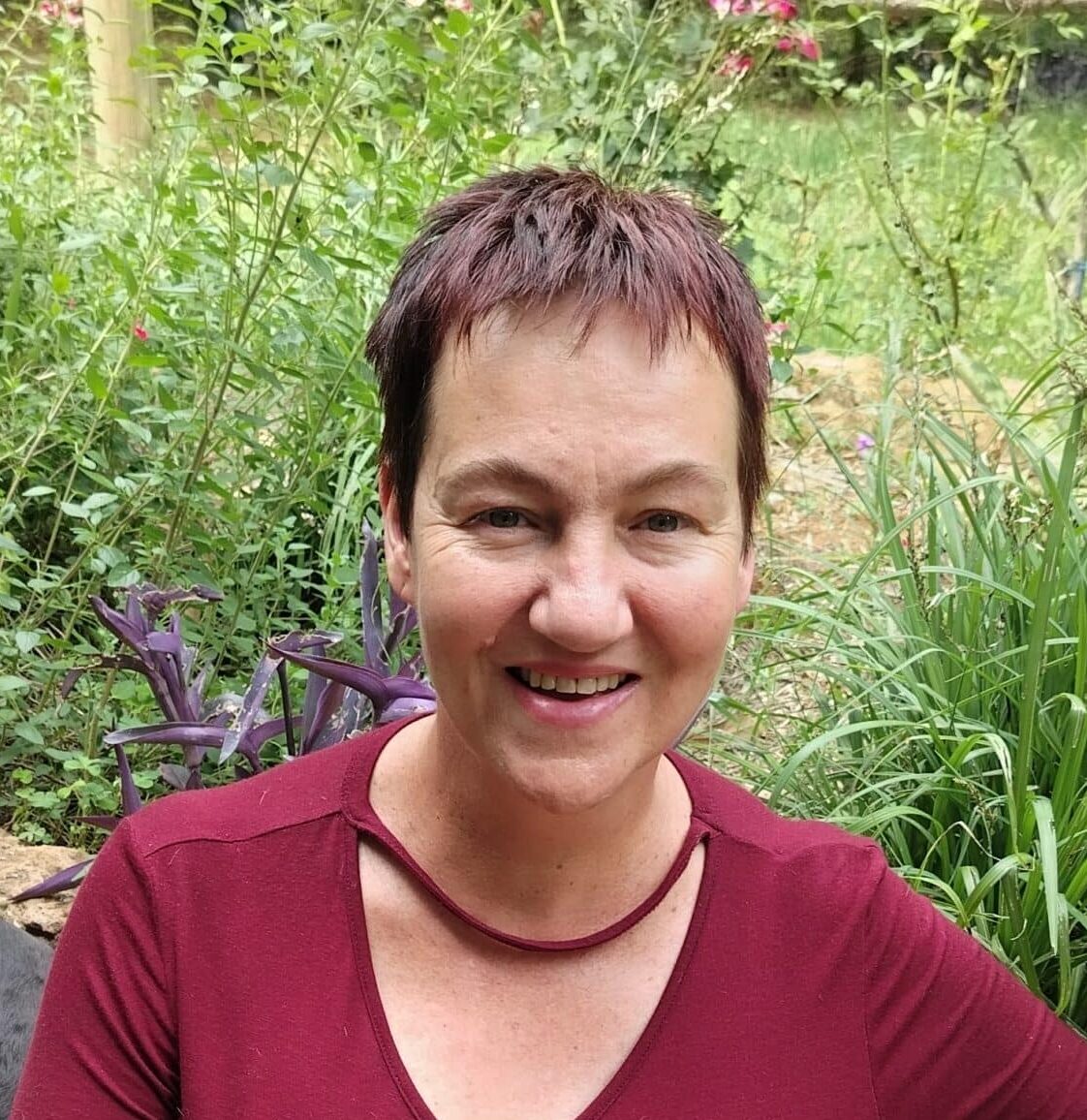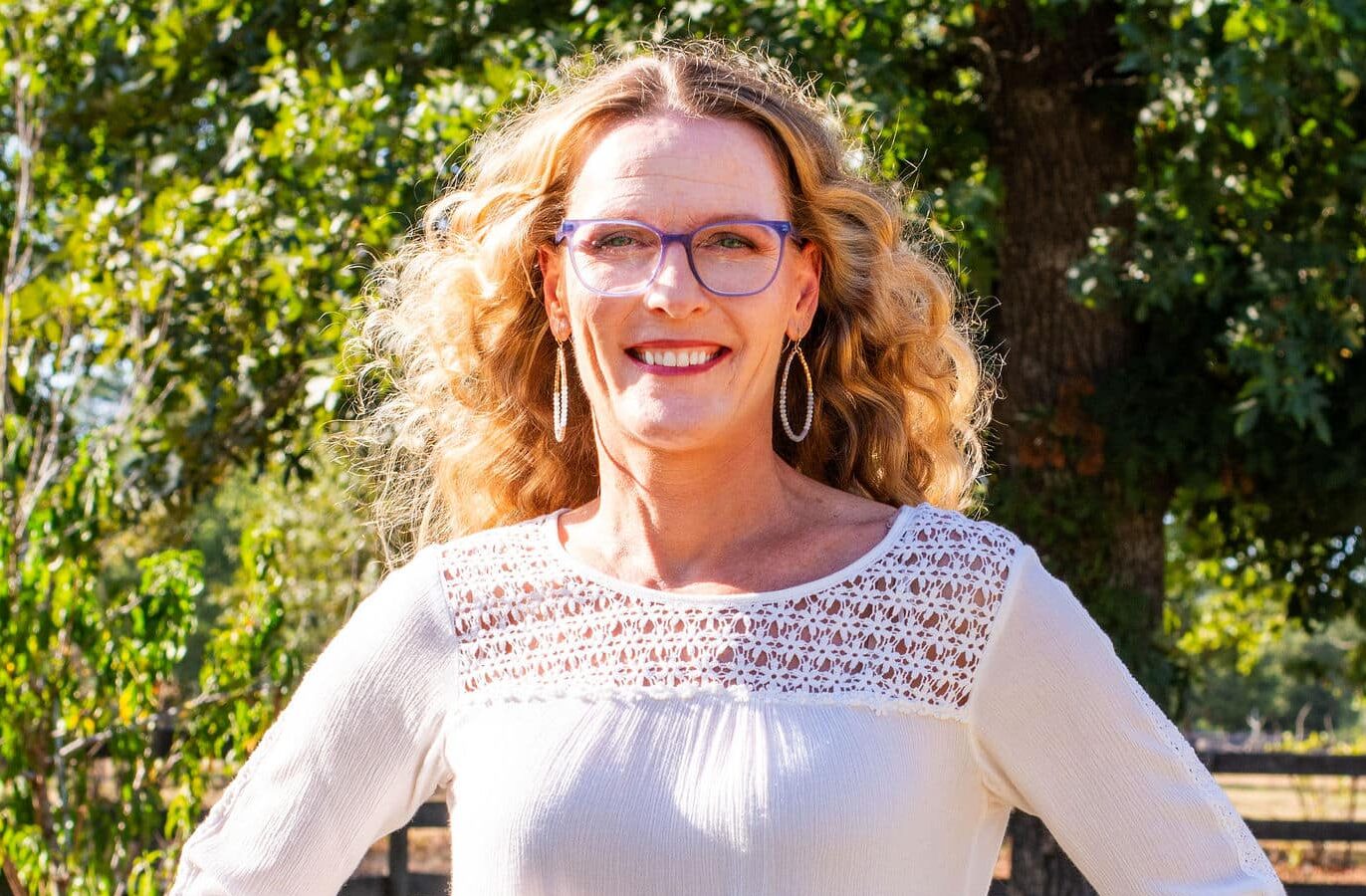FMCA alumni never cease to inspire with the unique ways they blend health coaching into their careers, and Janie Cancila is no exception. As a trauma nurse and functional medicine health coach, Janie has discovered how combining her clinical experience with health coaching can make a profound difference in patient care.
Janie graduated from nursing school in 2013 and quickly found herself working in a high-pressure trauma unit. After years of demanding work, she eventually burned out and began searching for a career path that aligned more with her passion for patient-centered care. During the pandemic, she discovered functional medicine, which led her to explore the Functional Medicine Coaching Academy.
After graduating from FMCA, Janie initially thought she would transition entirely to health coaching, but her background as a nurse created an unexpected opportunity. Now, she works in a functional medicine office where she balances both nursing and coaching roles, providing a holistic approach to care for her patients.
“I really wanted to do something I was more passionate about. I love that now, as a nurse and a health coach, I can sit with patients, listen to them, and help them come to their own conclusions.”
Janie Cancila, FMCA graduate
Janie’s ability to merge the skills she gained through FMCA with her nursing expertise has made her a key part of a collaborative healthcare team. Her story is a perfect example of how functional medicine coaches can play a transformative role in patient care, helping individuals achieve lasting wellness.
We’re so proud to see Janie using her health coaching skills alongside her clinical knowledge, enhancing the care she provides to her community. Watch the full interview with Janie below.
Watch the Interview
Watch Janie Cancila’s FMCA Alumni Spotlight interview here.

Meet Janie
Janie Cancila, RN, FMCHC
Janie Cancila has been a registered nurse since February 2013, with experience in med-surg, level one trauma, and surgical roles. During the pandemic, she became deeply interested in functional medicine and quickly realized she was meant for something better—something without the frustrations that had become so prevalent in healthcare and Western medicine. After a friend’s suggestion, she found the Functional Medicine Coaching Academy (FMCA) and dove in headfirst. Today, Janie works as a functional medicine specialty nurse, a role she describes as a dream come true. She believes that as trailblazers in functional medicine, she makes a difference every day, and as the field advances, the sky’s the limit. She credits her experience at FMCA for helping her land where she is today.
Connect
Transcript
Kerry: Hi there. My name is Kerry, and I am on the admissions team at the Functional Medicine Coaching Academy, and today I have Janie with me and interesting story, because Janie and I met about two and a half years ago, and Janie called in for an admissions call to learn more about our program, and here we are, probably, yeah, two and a half years later, and she’s a graduate of the program, and I’ve asked Jamie to come talk to me, because she’s a nurse, and I get a lot of calls from nurses interested in health coaching, and some nurses want to switch careers altogether, and some nurses would like to use the coaching skills to enhance what they’re already doing. And I can remember one thing about my conversation with you back then, Janie, and you said, it’s like, I want to do something I am more passionate about. And I wrote that quote down. So first of all, I want to say thank you for meeting with me today. And so, yeah, let’s start there. Tell me about like, what you were doing before you became a student at FMCA.
Janie: Yeah. So I became a nurse in 2013 and right out of school, I went right into a level one trauma center and worked in on the trauma unit for about six years. I didn’t really realize how burned out I was until I left and I went to something a little more lax. I went to post surgery. So I was a pacu nurse, an outpatient center, so really, a lot of healthy people. And then, you know, I had bartender in the past, so I was doing a little bit of that here and there, just because I missed the atmosphere. And I missed talking to a lot of people waiting people are from anesthesia. They don’t remember a lot.
Kerry: So, so, so ultimately, you, you know, made that call to me. So what brought you to functional medicine and or health coaching? Did you have, maybe your own personal health journey? Or, you know, how do you find us?
Janie: So during covid, I had a couple part time jobs. I was working part time, bartending, part time at the hospital. And because of covid, I found myself sitting in my apartment, you know, not able to go anywhere with, really, without a job. So I kind of turned inward, and I started meditating. I started doing some intermittent fasting, you know, I listened to anything Mark Hyman would say, and started really getting into functional medicine. And it really started to, you know, kind of, you know, move me. I found that all my body image issues, you know, were disappearing. And I was finding that if I respected my body and paid attention to what I put into it and how I treated it, that that I got the results I’d always wanted. And and then a friend of mine who has had some bold issues, knew a lot about functional medicine, and she suggested that I that I look into the functional medicine Coaching Academy, because I really wanted to be able to make a bigger difference in people’s lives.
Kerry: Yeah, I love that. And that’s a, you know, one of the nice things that did come out of the pandemic is that we did get that chance a little bit bit of extra time to turn inward and focus on things that we didn’t have time to before that. Thank you for sharing that. So how are you using your health coaching now? Or how is your health coaching helping, helping you make an impact on those in your community or your patients?
Janie: You know? So originally I thought that I just wanted to completely switch gears and be a health coach, but I was really passionate about functional medicine. And after I graduated, you know, I stayed in contact with a lot of people, and I was kind of exploring my avenues. And then I saw a job pop up to work for a functional medicine doctor right around the corner from where I live. And so I applied for it, and I, you know, I mentioned that I was a functional medicine health coach and that I was also a nurse, and when they called me for the interview, they had the position open for nursing. Because I really, initially I didn’t want to be a nurse anymore, but once I had this opportunity, I thought, well, wouldn’t it be great to be able to do both? And you know, suddenly I’m part of a collaborative team. And, you know, we have health coaches, and I can certainly help them in that area, but I also do the nursing part of it.
Kerry: Oh, that’s wonderful. You got to get the best of both worlds. Yeah. So tell me about how some of the skills that you learned at FMCA could benefit your patients.
Janie: Now, you know, a lot of the procedures that we do at the at the office, we spend a lot of time with the patients. You know, a lot of them are at the end of their rope. They’ve tried conventional medicine, they’ve tried Western medicine, and it just nothing has worked for them. So to be able to sit, to be able to sit across from them during these procedures, you know, they have their meal plans, they have they’ve they’ve had their health coaching sessions, but to be able to sit there and listen, you know, have that active listening, and not just the teaching part as a nurse, but to be able to listen and to be able to steer them in the direction of, you know, them, them ending up, you know, with the results they want, and them kind of coming to their own conclusions. It’s been really helpful. I’ve been able to help out the health coaches in a lot of ways, and they’ve taught me a lot. It’s kind of been, you know, we’ve taught each other a lot. And, you know, as part of that collaborative team, it’s just been really nice. You know, it’s kind of everything they talked about in the programs, being part of a collaborative team. You’re not going off on your own. That’s exactly what I’m doing now.
Kerry: Oh, wow, I love that. That’s just a nice experience. So let’s go back a bit to when you were a student, and what did you enjoy most about the program?
Janie: You know, initially I was, I was pretty nervous, just because, you know, you kind of jump right into coaching. And then here I am, across the screen from from these, these people I’ve never met, but I mean, it wasn’t long before, I mean, I formed these lifelong these lifelong friendships and these connections. And I mean, I was just talking about to one of my cohorts the other day. I mean, we all keep in touch, you know, we all cheer each other on. And so the relationships that I made, I think, is my favorite part of the coaching, and also just just the amount of resources out there, you know, the information that I still have access to, you know? I mean, we’re really, we’re trailblazers, you know, and it’s nice to be able to, as the new information comes in, be a part of that. So, yeah.
Kerry: I’m going to jump around here a little bit, because you hit on the fact that you still keep in touch with people in your cohort myself as well. Tell me a little bit about that, because we like to say, like, you’re an FMC graduate for life. And like, what does that mean to you? And tell me about your FMCA community.
Janie: So we actually ended up forming our own Whatsapp group, because it’s a good way for us to all keep in touch. And you know, as soon as you know people you know we all will check in and say, I have this interview. Or, Hey, this is my new flyer. This is my new brochure. What do you think of this? So, you know, we’ll help each other do editing. You know, we cheer each other on. There’s been a lot of networking that’s happened. I know that two of the girls from my cohort have actually kind of joined forces, and they’re kind of doing something online together, because, you know, one of them has a background as a nutritionist, and the other one has a background, you know, as a, you know, as a healthcare provider. So there’s just so many options, you know.
Kerry: Oh, that’s so neat. I love that. And then Whatsapp group, that’s great. So when you were thinking about joining FMCA, what are like? Did you have any fears or any barriers to coming into the program?
Janie: So I think my biggest barrier had to do with because I was a nurse, the coaching versus the teaching, I think was my biggest barrier. You know, I would, I would, I would be doing the program in the evenings. I had an evening classes, and then during the day, I’m, I’m waking people up from anesthesia, and I’m teaching the family about what they need to do once they’re discharged. So I had, I was very fearful and just really nervous about not being able to make those switches. But it turned out that it actually really helped me to do so, and I found myself doing not only teaching, but also a lot of coaching with patients, and I ended up making the follow up calls at the surgery center and doing a lot of coaching. So that fear kind of melted away. And the other fear was just, you know, not really knowing what exactly we were all supposed to be doing with this coaching. But you kind of, you figure it out together as you go along, and you really learn a lot from each other. And by the end, I was, you know, instead of being nervous about having to, you know, coach somebody in front of everybody. I was I was excited, you know? So, yeah, I was surprised and happy about that.
Kerry: Oh, that’s lovely, I like to say sometimes. So just, just let the path unfold in front of you. It’s okay to not know exactly what this is going to look like on the other side. And that’s a hard thing to let go of, you know, we want to know exactly what things are going to be on the other side, but it is a process and self discovery. Yeah, yeah. So how did FMCA prepare you to be successful health coach slash nurse?
Janie: You know, a lot of the tools that I learned, first of all, the character strengths. I mean, I still today. I remember, you know, we were, we would talk in our in our in our online community about, you know, just using character strengths, picking them out, and just, you know, instead of saying thank you to somebody, say thank you for your kindness, you know, pick those specific traits. And you really do see people kind of set up straighter when, you know, you point one of those out. You know, it’s not just lip service. It’s actually a specific thing. And we all have them, you know. So that was, that was something I really enjoyed and still enjoy, and also just, you know, positive emotion, you know, focusing on what’s right with the person instead of what’s wrong. And then also, I have a tendency to speak really quickly. I learned how to pause, because a lot of times, if you stop, somebody has something more to say, right?
Kerry: That’s a lot to get used to. To be comfortable with some silence, right?
Janie: It is. It is. And I had never really worked virtually. So those were some of the things that I learned and I and they’ve really helped me out.
Kerry: Thank you for sharing that. So if I had a nurse calling and saying, Gosh, I’m, you know, not sure about this, what advice would you give to a nurse that’s thinking about embarking on this journey of becoming a functional medicine certified health coach?
Janie: You know, if you want to help patients more than you can, more than you’re able to. If you really want to kind of think outside the box and do things outside the box within your scope, this is the way to do it. You learn tools that you know, you’re not doing anything that’s outside of your scope, but you’re doing more, you know, you’re going that extra mile, and it just becomes so natural. And you really make those connections a lot a lot easier with people and and, you know, people just tend to let their guard down. A lot were around me, you know. And I think that, as a nurse, that’s really important, because they trust us, you know. I mean, we’re on their side, you know, they’re a lot of people, especially in functional medicine, they don’t, they’re not, they’re, they’re just, they’re so they’re so fed up with hearing the same things. And, you know, they want to be able to trust somebody, so for you to be able to have the skills from FMCA along with what you already have, clinically, it’s a world of difference.
Kerry: I really appreciate you sharing that with me. It is so neat for me to sit here and you know, have we’ve come full circle, and to see you on the other side. It’s a joy, and it you know. So this is why I do what I do, because I love to see success stories like yours, and I do appreciate your sharing your journey with us today. Any last thing you want to share?
Janie: You know, I would just say, you know, I was, I was able to, you know, you were very helpful when I first started out. And I would, you know, maybe talk to some people that have been in the program, you know? I mean, that’s what I did. I talked to two different people, and I still talk to those people. They are still resources of mine. One, one woman didn’t have any healthcare background. She was a an accountant, but that really helped her when she set up her own business for coaching. And she has, I’m actually still a contact for her, because she supports elderly people, and a lot of times she has questions medical questions that she doesn’t know the answers to. So, you know, you really do find the most incredible resources that are so useful, and they continue, you know, they just continue to produce more and more, you know, opportunity.
Kerry: Yep, it’s all about that community. Well, thank you, Janie, I really appreciate this time, and it was so fun to circle back with you.
Janie: Oh, thanks. I’m happy to do it. It’s great talking to you. Bye.
Our Latest Blogs
-

Student Spotlight: Sonja Brink
Read Full Article: Student Spotlight: Sonja Brink -

Alumni Spotlight: Angela Balboa
Read Full Article: Alumni Spotlight: Angela Balboa -

FMCA Community Impact Scholarship Recipients For March 2026 Announced
Read Full Article: FMCA Community Impact Scholarship Recipients For March 2026 Announced

